- Home
- Roald Dahl
The Wonderful Story of Henry Sugar and Six More Page 17
The Wonderful Story of Henry Sugar and Six More Read online
Page 17
The next afternoon, the field telephone rang and a voice said, "We are at war with Germany." Within minutes, far away in the distance, I saw a line of cars throwing up clouds of dust, heading our way, beating it for the neutral territory of Portuguese East Africa as fast as they could go.
Ho ho, I thought. We are going to have a little battle, and I called out to my twenty Askaris to prepare themselves. But there was no battle. The Germans, who were after all only civilian townspeople, saw our machine-gun and our rifles and quickly gave themselves up. Within an hour, we had a couple of hundred of them on our hands. I felt rather sorry for them. Many I knew personally, like Willy Hink the watchmaker and Herman Schneider who owned the soda-water factory. Their only crime had been that they were German. But this was war, and in the cool of the evening, we marched them all back to Dar-es-Salaam where they were put into a huge camp surrounded by barbed wire.
The next day, I got into my old car and drove north, heading for Nairobi, in Kenya, to join the R.A.F. It was a rough trip and it took me four days. Bumpy jungle roads, wide rivers where the car had to be put on to a raft and pulled across by a ferryman hauling on a rope, long green snakes sliding across the road in front of the car. (N.B. Never try to run over a snake because it can be thrown up into the air and may land inside your open car. It's happened many times.) I slept at night in the car. I passed below the beautiful Mount Kilimanjaro, which had a hat of snow on its head. I drove through the Masai country where the men drank cows' blood and every one of them seemed to be seven feet tall. I nearly collided with a giraffe on the Serengeti Plain. But I came safely to Nairobi at last and reported to R.A.F. headquarters at the airport.
For six months, they trained us in small aeroplanes called Tiger Moths, and those days were also glorious. We skimmed all over Kenya in our little Tiger Moths. We saw great herds of elephants. We saw the pink flamingoes on Lake Nakuru. We saw everything there was to see in that magnificent country. And often, before we could take off, we had to chase the zebras off the flying-field. There were twenty of us training to be pilots out there in Nairobi. Seventeen of those twenty were killed during the war.
From Nairobi, they sent us up to Iraq, to a desolate airforce base near Baghdad to finish our training. The place was called Habbaniyih, and in the afternoons it got so hot (130 degrees in the shade) that we were not allowed out of our huts. We just lay on the bunks and sweated. The unlucky ones got heat-stroke and were taken to hospital and packed in ice for several days. This either killed them or saved them. It was a fifty-fifty chance.
At Habbaniyih, they taught us to fly more powerful aeroplanes with guns in them, and we practised shooting at drogues (targets in the air pulled behind other planes) and at objects on the ground.
Finally, our training was finished, and we were sent to Egypt to fight against the Italians in the Western Desert of Libya. I joined 80 Squadron, which flew fighters, and at first we had only ancient single-seater bi-planes called Gloster Gladiators. The two machine-guns on a Gladiator were mounted one on either side of the engine, and they fired their bullets, believe it or not, through the propeller. The guns were somehow synchronized with the propeller shaft so that in theory the bullets missed the whirling propeller blades. But as you might guess, this complicated mechanism often went wrong and the poor pilot, who was trying to shoot down the enemy, shot off his own propeller instead.
I myself was shot down in a Gladiator which crashed far out in the Libyan desert between the enemy lines. The plane burst into flames, but I managed to get out and was finally rescued and carried back to safety by our own soldiers who crawled out across the sand under cover of darkness.
That crash sent me to hospital in Alexandria for six months with a fractured skull and a lot of burns. When I came out, in April 1941, my squadron had been moved to Greece to fight the Germans who were invading from the north. I was given a Hurricane and told to fly it from Egypt to Greece and join the squadron. Now, a Hurricane fighter was not at all like the old Gladiator. It had eight Browning machine-guns, four in each wing, and all eight of them fired simultaneously when you pressed the small button on your joy-stick. It was a magnificent plane, but it had a range of only two hours' flying-time. The journey to Greece, non-stop, would take nearly five hours, always over the water. They put extra fuel tanks on the wings. They said I would make it. In the end, I did. But only just. When you are six feet six inches tall, as I am, it is no joke to be sitting crunched up in a tiny cockpit for five hours.
In Greece, the R.A.F. had a total of about eighteen Hurricanes. The Germans had at least one thousand aeroplanes to operate with. We had a hard time. We were driven from our aerodrome outside Athens (Elevis), and flew for a while from a small secret landing strip further west (Menidi). The Germans soon found that one and bashed it to bits, so with the few planes we had left, we flew off to a tiny field (Argos) right down in the south of Greece, where we hid our Hurricanes under the olive trees when we weren't flying.
But this couldn't last long. Soon, we had only five Hurricanes left, and not many pilots still alive. Those five planes were flown to the island of Crete. The Germans captured Crete. Some of us escaped. I was one of the lucky ones. I finished up back in Egypt. The squadron was re-formed and re-equipped with Hurricanes. We were sent off to Haifa, which was then in Palestine (now Israel), where we fought the Germans again and the Vichy French in Lebanon and Syria.
At that point, my old head injuries caught up with me. Severe headaches compelled me to stop flying. I was invalided back to England and sailed on a troopship from Suez to Durban to Capetown to Lagos to Liverpool, chased by German submarines in the Atlantic and bombed by long-range Focke-Wulf aircraft every day for the last week of the voyage.
I had been away from home for four years. My mother, bombed out of her own house in Kent during the Battle of Britain and now living in a small thatched cottage in Buckinghamshire, was happy to see me. So were my four sisters and my brother. I was given a month's leave. Then suddenly I was told I was being sent to Washington D.C. in the United States of America as Assistant Air Attache. This was January 1942, and one month earlier the Japanese had bombed the American fleet in Pearl Harbor. So the United States was now in the war as well.
I was twenty-six years old when I arrived in Washington, and I still had no thoughts of becoming a writer.
During the morning of my third day, I was sitting in my new office at the British Embassy and wondering what on earth I was meant to be doing, when there was a knock on my door. "Come in."
A very small man with thick steel-rimmed spectacles shuffled shyly into the room. "Forgive me for bothering you," he said.
"You aren't bothering me at all," I answered. "I'm not doing a thing."
He stood before me looking very uncomfortable and out of place. I thought perhaps he was going to ask for a job.
"My name," he said, "is Forester. C. S. Forester."
I nearly fell out of my chair. "Are you joking?" I said.
"No," he said, smiling. "That's me."
And it was. It was the great writer himself, the inventor of Captain Hornblower and the best teller of tales about the sea since Joseph Conrad. I asked him to take a seat.
"Look," he said. "I'm too old for the war. I live over here now. The only thing I can do to help is to write things about Britain for the American papers and magazines. We need all the help America can give us. A magazine called the Saturday Evening Post will publish any story I write. I have a contract with them. And I have come to you because I think you might have a good story to tell. I mean about flying."
"No more than thousands of others," I said. "There are lots of pilots who have shot down many more planes than me."
"That's not the point," Forester said. "You are now in America, and because you have, as they say over here, 'been in combat', you are a rare bird on this side of the Atlantic. Don't forget they have only just entered the war."
"What do you want me to do?" I asked.
"Come and have lun
ch with me," he said. "And while we're eating, you can tell me all about it. Tell me your most exciting adventure and I'll write it up for the Saturday Evening Post. Every little bit helps."
I was thrilled. I had never met a famous writer before. I examined him closely as he sat in my office. What astonished me was that he looked so ordinary. There was nothing in the least unusual about him. His face, his conversation, his eyes behind the spectacles, even his clothes were all exceedingly normal. And yet here was a writer of stories who was famous the world over. His books had been read by millions of people. I expected sparks to be shooting out of his head, or at the very least, he should have been wearing a long green cloak and a floppy hat with a wide brim.
But no. And it was then I began to realize for the first time that there are two distinct sides to a writer of fiction. First, there is the side he displays to the public, that of an ordinary person like anyone else, a person who does ordinary things and speaks an ordinary language. Second, there is the secret side which comes out in him only after he has closed the door of his workroom and is completely alone. It is then that he slips into another world altogether, a world where his imagination takes over and he finds himself actually living in the places he is writing about at that moment. I myself, if you want to know, fall into a kind of trance and everything around me disappears. I see only the point of my pencil moving over the paper, and quite often two hours go by as though they were a couple of seconds.
"Come along," C S. Forester said to me. "Let's go to lunch. You don't seem to have anything else to do."
As I walked out of the Embassy side by side with the great man, I was churning with excitement. I had read all the Hornblowers and just about everything else he had written. I had, and still have, a great love for books about the sea. I had read all of Conrad and all of that other splendid sea-writer, Captain Marryat (Mr Midshipman Easy, From Powder Monkey to Admiral, etc.), and now here I was about to have lunch with somebody who, to my mind, was also pretty terrific.
He took me to a small expensive French restaurant somewhere near the Mayflower Hotel in Washington. He ordered a sumptuous lunch, then he produced a notebook and a pencil (ballpoint pens had not been invented in 1942) and laid them on the tablecloth. "Now," he said, "tell me about the most exciting or frightening or dangerous thing that happened to you when you were flying fighter planes."
I tried to get going. I started telling him about the time I was shot down in the Western Desert and the plane had burst into flames.
The waitress brought two plates of smoked salmon.
While we tried to eat it, I was trying to talk and Forester was trying to take notes.
The main course was roast duck with vegetables and potatoes and a thick rich gravy. This was a dish that required one's full attention as well as two hands. My narrative began to flounder. Forester kept putting down the pencil and picking up the fork, and vice versa. Things weren't going well. And apart from that, I have never been much good at telling stories aloud.
"Look," I said. "If you like, I'll try to write down on paper what happened and send it to you. Then you can rewrite it properly yourself in your own time. Wouldn't that be easier? I could do it tonight."
That, though I didn't know it at the time, was the moment that changed my life.
"A splendid idea," Forester said. "Then I can put this silly notebook away and we can enjoy our lunch. Would you really mind doing that for me?"
"I don't mind a bit," I said. "But you mustn't expect it to be any good. I'll just put down the facts."
"Don't worry," he said, "So long as the facts are there, I can write the story. But please," he added, "let me have plenty of detail. That's what counts in our business, tiny little details, like you had a broken shoelace on your left shoe, or a fly settled on the rim of your glass at lunch, or the man you were talking to had a broken front tooth. Try to think back and remember everything."
"I'll do my best," I said.
He gave me an address where I could send the story, and then we forgot all about it and finished our lunch at leisure. But Mr Forester was not a great talker. He certainly couldn't talk as well as he wrote, and although he was kind and gentle, no sparks ever flew out of his head and I might just as well have been talking to an intelligent stockbroker or lawyer.
That night, in the small house I lived in alone in a suburb of Washington, I sat down and wrote my story. I started at about seven o'clock and finished at midnight. I remember I had a glass of Portuguese brandy to keep me going. For the first time in my life, I became totally absorbed in what I was doing. I floated back in time and once again I was in the sizzling hot desert of Libya, with white sand underfoot, climbing up into the cockpit of the old Gladiator, strapping myself in, adjusting my helmet, starting the motor and taxiing out for take-off. It was astonishing how everything came back to me with absolute clarity. Writing it down on paper was not difficult. The story seemed to be telling itself, and the hand that held the pencil moved rapidly back and forth across each page. Just for fun, when it was finished, I gave it a title. I called it "A Piece of Cake".
The next day, somebody in the Embassy typed it out for me and I sent it off to Mr Forester. Then I forgot all about it.
Exactly two weeks later, I received a reply from the great man. It said:
Dear RD, You were meant to give me notes, not a finished story. I'm bowled over. Your piece is marvellous. It is the work of a gifted writer. I didn't touch a word of it. 1 sent it at once under your name to my agent, Harold Matson, asking him to offer it to the Saturday Evening Post with my personal recommendation. You will be happy to hear that the Post accepted it immediately and have paid one thousand dollars. Mr Matson's commission is ten per cent. I enclose his check for nine hundred dollars. It's all yours. As you will see from Mr Matson's letter, which 1 also enclose, the Post is asking if you will write more stories for them. I do hope you will. Did you know you were a writer? With my very best wishes and congratulations, C. S. Forester.
"A Piece of Cake" is printed at the end of this book.
Well! I thought. My goodness me! Nine hundred dollars! And they're going to print it! But surely it can't be as easy as all that? Oddly enough, it was.
The next story I wrote was fiction. I made it up. Don't ask me why. And Mr Matson sold that one, too. Out there in Washington in the evenings over the next two years, I wrote eleven short stories. All were sold to American magazines, and later they were published in a little book called Over to You.
Early on in this period, I also had a go at a story for children. It was called "The Gremlins", and this I believe was the first time the word had been used. In my story, Gremlins were tiny men who lived on R.A.F. fighter-planes and bombers, and it was the Gremlins, not the enemy, who were responsible for all the bullet-holes and burning engines and crashes that took place during combat. The Gremlins had wives called Fifinellas, and children called Widgets, and although the story itself was clearly the work of an inexperienced writer, it was bought by Walt Disney who decided he was going to make it into a full-length animated film. But first it was published in Cosmopolitan Magazine with Disney's coloured illustrations (December 1942), and from then on, news of the Gremlins spread rapidly through the whole of the R.A.F. and the United States Air Force, and they became something of a legend.
Because of the Gremlins, I was given three weeks' leave from my duties at the Embassy in Washington and whisked out to Hollywood. There, I was put up at Disney's expense in a luxurious Beverly Hills hotel and given a huge shiny car to drive about in. Each day, I worked with the great Disney at his studios in Burbank, roughing out the story-line for the forthcoming film. I had a ball. I was still only twenty-six. I attended story-conferences in Disney's enormous office where every word spoken, every suggestion made, was taken down by a stenographer and typed out afterwards. I mooched around the rooms where the gifted and obstreperous animators worked, the men who had already created Snow White, Dumbo, Bambi and other marvellous films, and in those da
ys, so long as these crazy artists did their work, Disney didn't care when they turned up at the studio or how they behaved.
When my time was up, I went back to Washington and left them to it.
My Gremlin story was published as a children's book in New York and London, full of Disney's colour illustrations, and it was called of course The Gremlins. Copies are very scarce now and hard to come by. I myself have only one. The film, also, was never finished. I have a feeling that Disney was not really very comfortable with this particular fantasy. Out there in Hollywood, he was a long way away from the great war in the air that was going on in Europe. Furthermore, it was a story about the Royal Air Force and not about his own countrymen, and that, I think, added to his sense of bewilderment. So in the end, he lost interest and dropped the whole idea.
My little Gremlin book caused something else quite extraordinary to happen to me in those wartime Washington days. Eleanor Roosevelt read it to her grandchildren in the White House and was apparently much taken with it. I was invited to dinner with her and the President. I went, shaking with excitement. We had a splendid time and I was invited again. Then Mrs Roosevelt began asking me for week-ends to Hyde Park, the President's country house. Up there, believe it or not, I spent a good deal of time alone with Franklin Roosevelt during his relaxing hours. I would sit with him while he mixed the martinis before Sunday lunch, and he would say things like, "I've just had an interesting cable from Mr Churchill." Then he would tell me what it said, something perhaps about new plans for the bombing of Germany or the sinking of U-Boats, and I would do my best to appear calm and chatty, though actually I was trembling at the realization that the most powerful man in the world was telling me these mighty secrets. Sometimes he drove me around the estate in his car, an old Ford I think it was, that had been specially adapted for his paralysed legs. It had no pedals. All the controls were worked by his hands. His secret-service men would lift him out of his wheel-chair into the driver's seat, then he would wave them away and off we would go, driving at terrific speeds along the narrow roads.

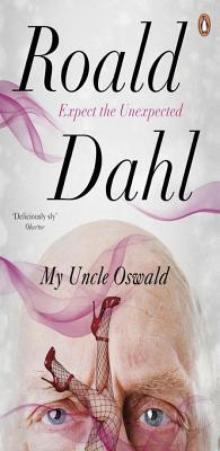 My Uncle Oswald
My Uncle Oswald The Best of Roald Dahl
The Best of Roald Dahl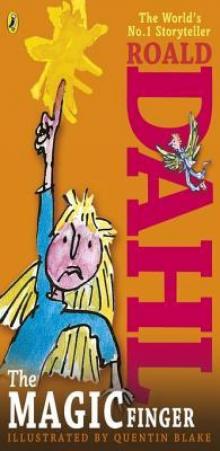 The Magic Finger
The Magic Finger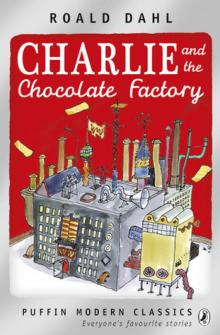 Charlie and the Chocolate Factory
Charlie and the Chocolate Factory Fantastic Mr Fox
Fantastic Mr Fox Matilda
Matilda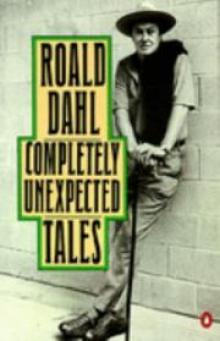 Completely Unexpected Tales: Tales of the Unexpected. More Tales of the Unexpected
Completely Unexpected Tales: Tales of the Unexpected. More Tales of the Unexpected The Wonderful Story of Henry Sugar and Six More
The Wonderful Story of Henry Sugar and Six More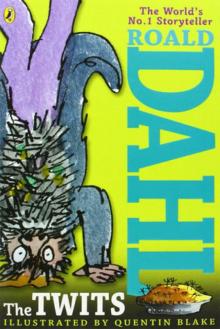 The Twits
The Twits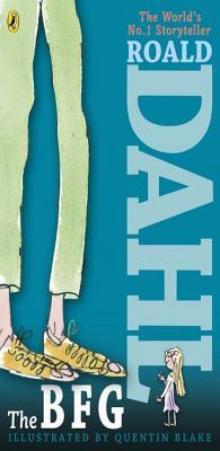 The BFG
The BFG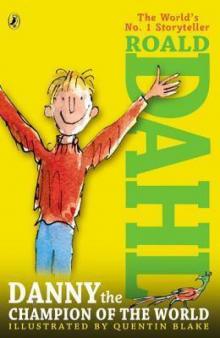 Danny the Champion of the World
Danny the Champion of the World The Witches
The Witches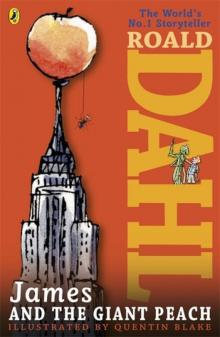 James and the Giant Peach
James and the Giant Peach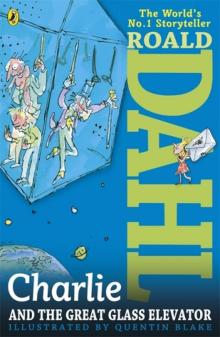 Charlie and the Great Glass Elevator
Charlie and the Great Glass Elevator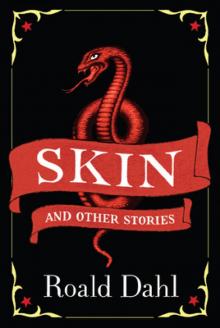 Skin and Other Stories
Skin and Other Stories Kiss Kiss
Kiss Kiss Switch Bitch
Switch Bitch The Giraffe and the Pelly and Me
The Giraffe and the Pelly and Me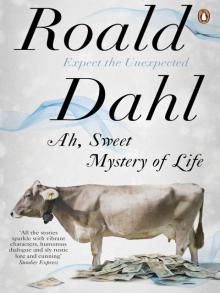 Ah, Sweet Mystery of Life
Ah, Sweet Mystery of Life Fear
Fear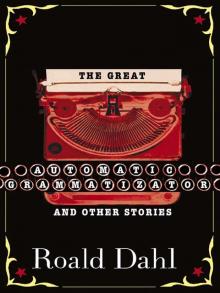 The Great Automatic Grammatizator and Other Stories
The Great Automatic Grammatizator and Other Stories Someone Like You
Someone Like You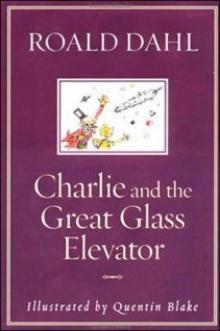 Charlie and the Great Glass Elevator c-2
Charlie and the Great Glass Elevator c-2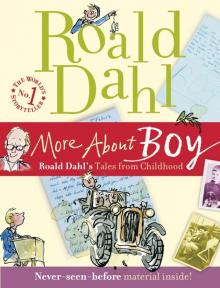 More About Boy
More About Boy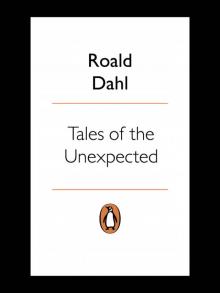 Tales of the Unexpected
Tales of the Unexpected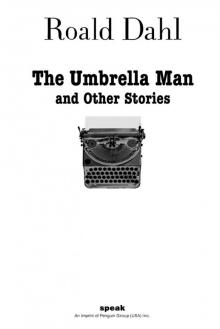 The Umbrella Man and Other Stories
The Umbrella Man and Other Stories Dirty Beasts
Dirty Beasts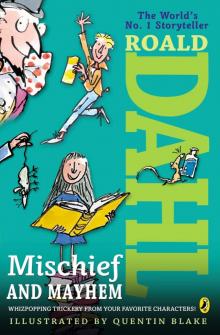 Roald Dahl's Mischief and Mayhem
Roald Dahl's Mischief and Mayhem The Collected Short Stories of Roald Dahl, Volume 1
The Collected Short Stories of Roald Dahl, Volume 1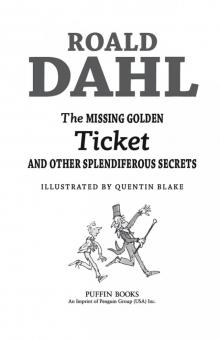 The Missing Golden Ticket and Other Splendiferous Secrets
The Missing Golden Ticket and Other Splendiferous Secrets Billy and the Minpins
Billy and the Minpins Over to You
Over to You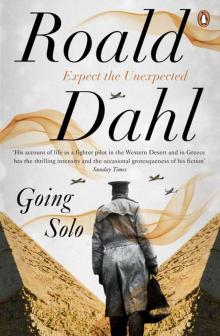 Going Solo
Going Solo Deception
Deception War
War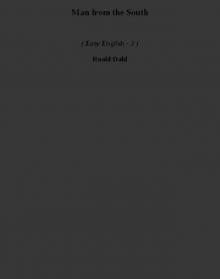 Man from the South ee-3
Man from the South ee-3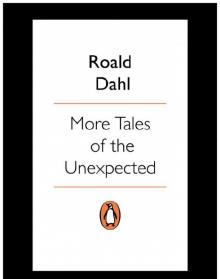 More Tales of the Unexpected
More Tales of the Unexpected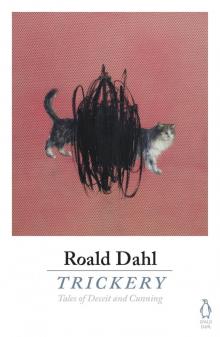 Trickery
Trickery Rhyme Stew
Rhyme Stew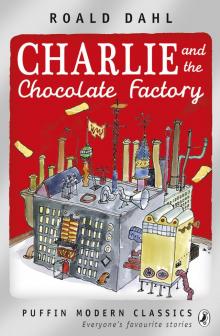 Charlie and the Chocolate Factory (Puffin Modern Classics relaunch)
Charlie and the Chocolate Factory (Puffin Modern Classics relaunch)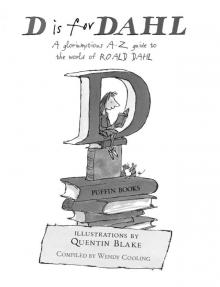 D is for Dahl
D is for Dahl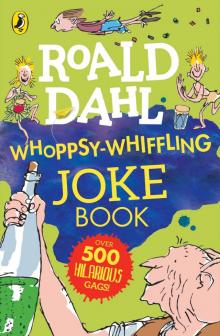 Roald Dahl Whoppsy-Whiffling Joke Book
Roald Dahl Whoppsy-Whiffling Joke Book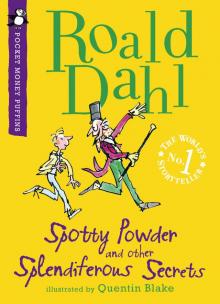 Spotty Powder and other Splendiferous Secrets
Spotty Powder and other Splendiferous Secrets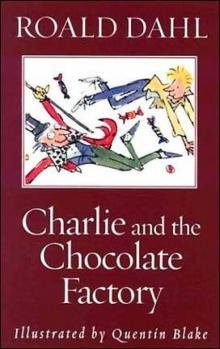 Charlie and the Chocolate Factory c-1
Charlie and the Chocolate Factory c-1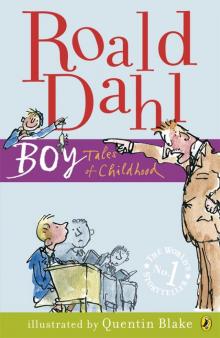 Boy
Boy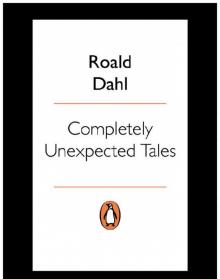 Completely Unexpected Tales
Completely Unexpected Tales Madness
Madness Innocence
Innocence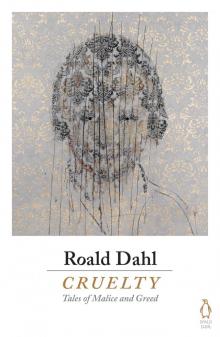 Cruelty
Cruelty George's Marvellous Medicine
George's Marvellous Medicine